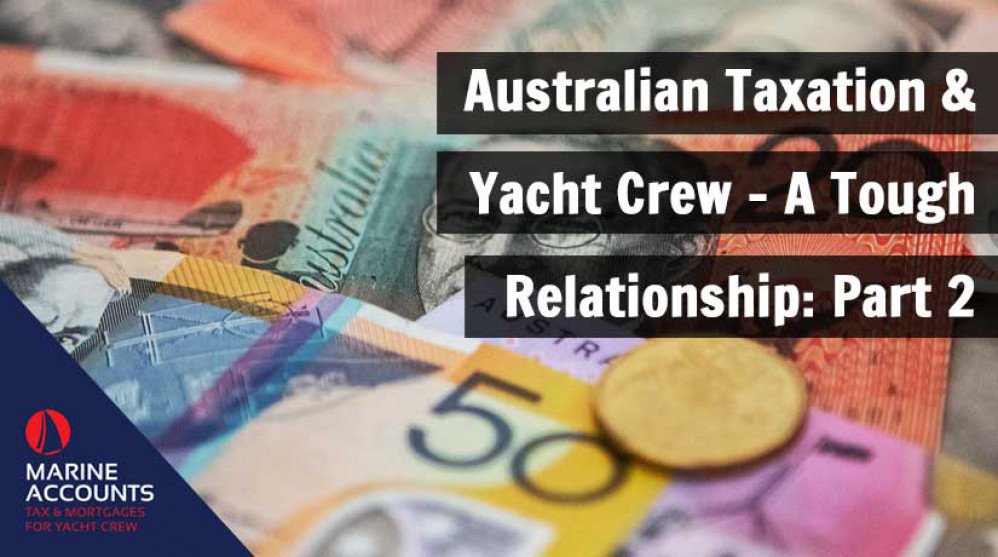Australian Taxation and Yacht Crew - A Tough Relationship: Part 2
- Authors
-
-

- Name
- Patrick Maflin
-

Image source: https://pixabay.com/photos/money-australia-notes-dollars-6010252/
Following the success of last weeks’ article, our mini-series on Australian taxation continues.
This week we will ask the question “what can we do to reduce our tax bill if we are to remain tax resident in Australia?”.
Once such means provided by Australian law which could be considered unusual when compared to other jurisdictions worldwide, is related to negatively gearing investment properties to create a loss.
What is negative gearing?
Australian law as it stands enables resident tax payers to use investments as a vehicle to reduce taxation.
The ‘negative gearing’ laws currently in effect allow residents to offset the cost of investing and maintaining a rental property, against gains income from employment or other investments.
To put it simply, your investment property is negatively geared if the following formula applies:
Net rental income – allowable rental expenses – annual interest payment on mortgage < $0
What the above formula means is that your investment property is negatively geared if your rental income is less than the cost of your interest only mortgage and the allowable expenses on the property combined.
If this is the case then the loss created can be deducted from your total taxable income from any other source, with the circumstances of yacht crew in mind this could be particularly useful to reduce the taxable amount from your employment offshore.

Image source: https://pixabay.com/photos/money-home-coin-investment-2724235/
Allowable Expenses
The obvious question now remains “what expenses can I claim to maximize my loss?”.
Key to this strategy are the interest payments on the mortgaged property.
Most commonly investors will choose an interest only mortgage, the reason for this being that whilst mortgage interest is an allowable expense, repayments towards the total amount borrowed are not.
Another important allowable expense to bear in mind is the capital works deduction.
The deduction is essentially designed to account for any depreciation in the value of the land and property.
Whilst a rule of thumb rate of 2.5% per annum is seen as typical, a quantity surveyor would be best placed to view the property and produce a specific report with the exact rate of deduction that should be applied.
The Australian Tax Office provides an exhaustive list of allowable expenses which can be applied on their website, a few of which can be found below:
- gardening and lawn mowing
- insurance - building, contents and public liability
- property agent fees and commissions
- repairs and maintenance
- stationery and postage
- water charges
Can this strategy be applied to other investment?
The simple answer to this question is yes, however it could be difficult to achieve the same value.
In preparation for this article, we consulted with a Sydney based tax accountant who gave an example of this.
It was explained that if you were to decide to invest in shares and took a loan in order to fund the purchase, the interest from this loan can be deducted from the gain from any dividends, thus creating a loss.
From this example you can see how borrowing money to fund the investment can be key to achieving a negative gearing and a tax-deductible expense to offset against your income.
As you can see from the above, whilst the Australian taxation system may be unforgiving to seafarers in terms of deductions for your employment income and achieving non-residency, it’s not all doom and gloom down under.
Speak to Us or Comment!
If you have concerns about your Australian tax residency status and how this affects your personal income tax obligations, we can help review your situation and offer advice. Alternatively, let us know what you think in the comments section below, or get in touch with us.
Please feel free to email us directly using the link below:
Click for Tax Return Advice for Seafarers & Yacht Crew
Consultation undertaken with Indu Sharma, Tax Manager, The Practice, Sydney, Australia
Liked this article? Try reading: Australian Taxation & Yacht Crew - A Tough Relationship: Part 1
Any advice in this publication is not intended or written by Marine Accounts to be used by a client or entity for the purpose of (i) avoiding penalties that may be imposed on any taxpayer or (ii) promoting, marketing or recommending to another party matters herein.


